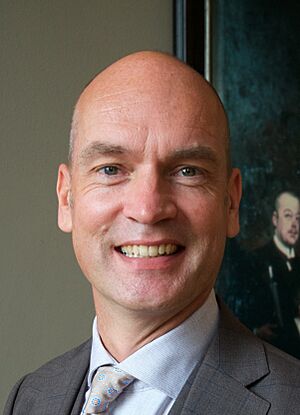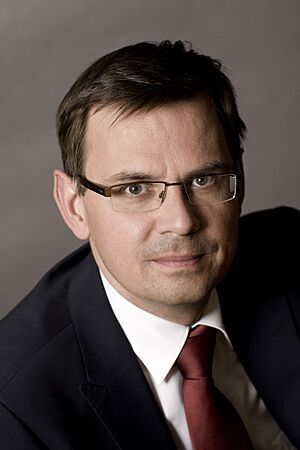Christian Union (Netherlands) facts for kids
Quick facts for kids <div style="padding-top:0.3em; padding-bottom:0.3em; border-top:2px solid Lua error in Module:European_and_national_party_data/config at line 227: attempt to index field 'data' (a nil value).; border-bottom:2px solid Lua error in Module:European_and_national_party_data/config at line 227: attempt to index field 'data' (a nil value).; line-height: 1;">
Christian Union
ChristenUnie
|
|
|---|---|
 |
|
| Abbreviation | CU |
| Leader | Mirjam Bikker (list) |
| Chairman | Marco Vermin |
| Leader in the Senate | Tineke Huizinga |
| Leader in the House of Representatives | Mirjam Bikker |
| Founded | 22 January 2000 |
| Merger of | Reformed Political Alliance Reformatory Political Federation |
| Headquarters | Partijbureau ChristenUnie Johan van Oldebarneveltlaan 46, Amersfoort |
| Youth wing | PerspectieF |
| Think tank | Mr. G. Groen van Prinsterer Stichting |
| Membership (January 2025) | |
| Ideology |
|
| Political position | Fiscal: Centre to centre-left Social: Centre-right |
| Religion | Orthodox Protestant |
| European affiliation | European Christian Political Party |
| European Parliament group | ECR Group (2009–2019) EPP Group (2019–2024) |
| Benelux Parliament group | Christian Group |
| Colours | <span style="background-color:Lua error in Module:European_and_national_party_data/config at line 227: attempt to index field 'data' (a nil value).; color:; border:1px solid darkgray; text-align:center;"> Sky blue Dark blue |
| Slogan | Dutch: Geef geloof een stem (Give faith a voice/vote) |
| Senate | Lua error in Module:European_and_national_party_data/config at line 227: attempt to index field 'data' (a nil value). |
| House of Representatives | Lua error in Module:European_and_national_party_data/config at line 227: attempt to index field 'data' (a nil value). |
| European Parliament | Lua error in Module:European_and_national_party_data/config at line 227: attempt to index field 'data' (a nil value). |
| Provincial councils |
21 / 570
<div style="background-color: Lua error in Module:European_and_national_party_data/config at line 227: attempt to index field 'data' (a nil value).; width: 4%; height: 100%;">
|
| King's Commissioners |
1 / 12
<div style="background-color: Lua error in Module:European_and_national_party_data/config at line 227: attempt to index field 'data' (a nil value).; width: 8%; height: 100%;">
|
| Benelux Parliament |
2 / 21
<div style="background-color: Lua error in Module:European_and_national_party_data/config at line 227: attempt to index field 'data' (a nil value).; width: 10%; height: 100%;">
|
| Website | |
| Lua error in Module:European_and_national_party_data/config at line 227: attempt to index field 'data' (a nil value). | |
The Christian Union (in Dutch: ChristenUnie, or CU) is a political party in the Netherlands. It is a Christian democratic party, which means its ideas are based on Christian values.
The party is considered to be in the center of politics. It has more progressive, or forward-thinking, ideas on topics like the economy, helping immigrants, and protecting the environment. However, it has more socially conservative views on other topics, meaning it supports traditional values. For example, the party has strong views on protecting life from its beginning to its natural end. The party calls itself "social Christian."
The Christian Union was formed in 2000 when two other parties, the Reformed Political League (GPV) and the Reformatory Political Federation (RPF), joined together. The party's policies are inspired by the Bible. It believes in important Christian ideas like charity (helping others) and stewardship (taking care of the Earth). These beliefs lead the party to support government spending on social programs and environmental protection.
Contents
History of the Christian Union
The Christian Union (CU) was officially created in January 2000. It started as a partnership between two smaller Protestant political parties: the Reformed Political League (GPV) and the Reformatory Political Federation (RPF). Before merging, these two parties had already started working together in the Dutch parliament in 1998.
By 2001, they had a single group of representatives in both houses of the Dutch parliament. In 2004, the two original parties officially stopped existing, and the Christian Union became one single, united party.
Early Elections and Growth
The CU first participated in an election in 2002, winning four seats in the House of Representatives. This was one less than the two parties had when they were separate. In the 2003 election, the party lost another seat, ending up with three. This was likely because some of their supporters chose to vote for the larger Christian Democratic Appeal (CDA) party.
A big moment for the party came in the 2006 Dutch general election. The Christian Union doubled its number of seats from three to six. This success allowed the party to join the government for the first time as part of the fourth Balkenende cabinet.
Serving in the Government

From 2006 to 2010, the CU was part of the ruling coalition. The party's leader, André Rouvoet, became the Deputy Prime Minister. Other CU members also became government ministers.
After being in the opposition for several years, the Christian Union joined the government again after the 2017 Dutch general election. It was a junior partner in the third Rutte cabinet. The party continued to be part of the government in the fourth Rutte cabinet, which served from 2022 to 2024.
In January 2023, Mirjam Bikker became the new leader of the party. In the 2023 Dutch general election, the Christian Union won three seats in the House of Representatives and is now an opposition party.
What the Christian Union Believes
The Christian Union calls itself a "Christian social" party. This means it mixes conservative views on social issues with more center-left ideas on the economy and the environment. The party's main beliefs come from the Bible and Protestant Christian teachings.
Two key ideas for the party are neighborly love and stewardship. Neighborly love means caring for others in society, especially those who need help. Stewardship means humans have a duty to take care of the planet God created.
Social and Ethical Policies
The party holds socially conservative views on many issues. This means it supports traditional values.
- It believes society should value rest, and that Sunday should be kept as a day of rest.
- It supports policies that protect life from conception to natural death.
- It wants to defend the freedom for people to start religious schools.
- It wants to limit the use of genetic technology.
Economic and Environmental Policies
On other issues, the party's ideas are more center-left.
- It believes important services like education and healthcare should be run by the government.
- It supports spending more money to help reduce poverty in poorer countries.
- It wants a welcoming policy for people seeking safety (asylum seekers), especially those who are treated unfairly because of their religion.
- It supports a strong environmental policy to protect nature. Greenpeace once called the CU the "greenest" party because of its plans for green energy.
Views on the European Union
The Christian Union supports the Netherlands being a member of the European Union (EU). It believes the EU helps keep peace and create prosperity. However, the party is also critical of the EU. It wants the EU to be more open and to respect the decisions of individual countries.
Election Results
The number of seats a party has in parliament can change after each election. Here is how the Christian Union has performed in elections for the House of Representatives, the most important house of the Dutch parliament.
| Election | Lead candidate | Votes | % | Seats | Government |
|---|---|---|---|---|---|
| 2002 | Kars Veling | 240,953 | 2.54 |
|
Opposition |
| 2003 | André Rouvoet | 204,649 | 2.12 |
|
Opposition |
| 2006 | 390,969 | 3.97 |
|
Coalition | |
| 2010 | 305,094 | 3.24 |
|
Opposition | |
| 2012 | Arie Slob | 294,586 | 3.13 |
|
Opposition |
| 2017 | Gert-Jan Segers | 356,271 | 3.39 |
|
Coalition |
| 2021 | 350,523 | 3.37 |
|
Coalition | |
| 2023 | Mirjam Bikker | 212,532 | 2.04 |
|
Opposition |
Who Supports the Christian Union?
The Christian Union's supporters are mainly orthodox Reformed Protestants. Many of its voters live in an area of the Netherlands known as the "Bible Belt". This is a strip of land with many towns where conservative Christianity is very common.
The party also gets support from Christians with immigrant backgrounds, who often live in big cities. In recent years, some conservative Roman Catholics who are unhappy with the larger Christian Democratic Appeal (CDA) party have also started to support the CU.
Party Organization
The Christian Union has a clear structure. The highest authority in the party is the Union Congress, where members from local branches make important decisions. They choose the party's leaders and decide the final party program.
- Youth Organization: The party's youth wing is called PerspectieF. It was created when the youth groups of the two original parties merged.
- Scientific Institute: The party's think tank is the Mr. Groen van Prinsterer Foundation. It researches and develops ideas for the party.
- International Groups: The CU is a member of the European Christian Political Party.
The party has strong connections with other Protestant organizations in the Netherlands. These include Protestant schools, newspapers, and the Evangelische Omroep broadcasting company.
Images for kids
-
Christian Union members in the third Rutte cabinet (from left): Paul Blokhuis, Carola Schouten, and Arie Slob.
See also
 In Spanish: Unión Cristiana para niños
In Spanish: Unión Cristiana para niños
 | Misty Copeland |
 | Raven Wilkinson |
 | Debra Austin |
 | Aesha Ash |





